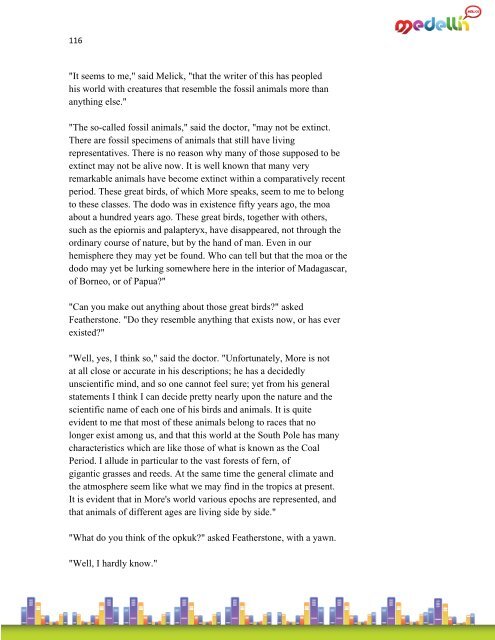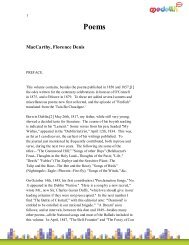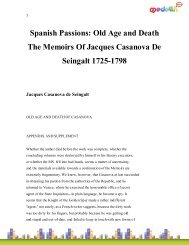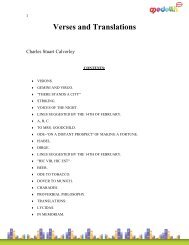A Strange Manuscript Found in a Copper Cylinder James De Mille
A Strange Manuscript Found in a Copper Cylinder James De Mille
A Strange Manuscript Found in a Copper Cylinder James De Mille
You also want an ePaper? Increase the reach of your titles
YUMPU automatically turns print PDFs into web optimized ePapers that Google loves.
116<br />
"It seems to me," said Melick, "that the writer of this has peopled<br />
his world with creatures that resemble the fossil animals more than<br />
anyth<strong>in</strong>g else."<br />
"The so-called fossil animals," said the doctor, "may not be ext<strong>in</strong>ct.<br />
There are fossil specimens of animals that still have liv<strong>in</strong>g<br />
representatives. There is no reason why many of those supposed to be<br />
ext<strong>in</strong>ct may not be alive now. It is well known that many very<br />
remarkable animals have become ext<strong>in</strong>ct with<strong>in</strong> a comparatively recent<br />
period. These great birds, of which More speaks, seem to me to belong<br />
to these classes. The dodo was <strong>in</strong> existence fifty years ago, the moa<br />
about a hundred years ago. These great birds, together with others,<br />
such as the epiornis and palapteryx, have disappeared, not through the<br />
ord<strong>in</strong>ary course of nature, but by the hand of man. Even <strong>in</strong> our<br />
hemisphere they may yet be found. Who can tell but that the moa or the<br />
dodo may yet be lurk<strong>in</strong>g somewhere here <strong>in</strong> the <strong>in</strong>terior of Madagascar,<br />
of Borneo, or of Papua?"<br />
"Can you make out anyth<strong>in</strong>g about those great birds?" asked<br />
Featherstone. "Do they resemble anyth<strong>in</strong>g that exists now, or has ever<br />
existed?"<br />
"Well, yes, I th<strong>in</strong>k so," said the doctor. "Unfortunately, More is not<br />
at all close or accurate <strong>in</strong> his descriptions; he has a decidedly<br />
unscientific m<strong>in</strong>d, and so one cannot feel sure; yet from his general<br />
statements I th<strong>in</strong>k I can decide pretty nearly upon the nature and the<br />
scientific name of each one of his birds and animals. It is quite<br />
evident to me that most of these animals belong to races that no<br />
longer exist among us, and that this world at the South Pole has many<br />
characteristics which are like those of what is known as the Coal<br />
Period. I allude <strong>in</strong> particular to the vast forests of fern, of<br />
gigantic grasses and reeds. At the same time the general climate and<br />
the atmosphere seem like what we may f<strong>in</strong>d <strong>in</strong> the tropics at present.<br />
It is evident that <strong>in</strong> More's world various epochs are represented, and<br />
that animals of different ages are liv<strong>in</strong>g side by side."<br />
"What do you th<strong>in</strong>k of the opkuk?" asked Featherstone, with a yawn.<br />
"Well, I hardly know."

















